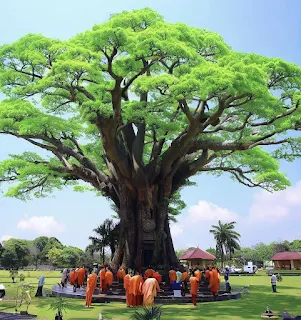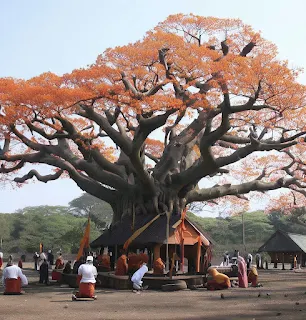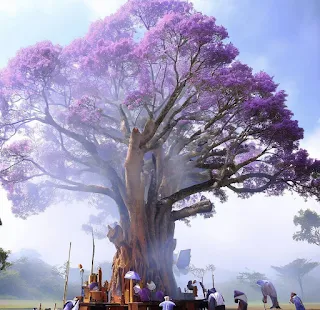Trees Are Messengers Between Heaven and Earth
Tree worship in Africa holds deep cultural and spiritual meaning, with trees regarded as sacred and honored messengers.
Across the African continent the Yoruba, Dogon, Akan, Ashanti, and Venda Tribal cultures have long-standing traditions of associating specific trees with deities, ancestral spirits, or natural forces, considering them as manifestations of divine power and wisdom.
To many African tribes trees are seen as living entities with their own spirits or souls. Trees possess the ability to communicate with humans and the spiritual realm. Sacred trees are found in important locations such as village centers, burial grounds, or near sacred sites, and they serve as focal points for religious rituals, ceremonies, and community gatherings.
These sacred trees are considered as intermediaries between the earthly realm and the divine. They provide a connection to ancestors and spiritual beings, offering a channel for prayer, meditation, and spiritual guidance. People leave offerings at the base of the tree, such as food, libations, or symbolic objects, as a way to honor and appease the associated spirits or deities.
The choice of sacred trees varies across different African cultures and regions. For instance, the towering iroko tree holds significant importance among the Yoruba people of Nigeria, symbolizing the presence of ancestral spirits and serving as a site for offerings and prayers.
By recognizing and respecting the significance of tree worship in Africa, not only can we honor ancient traditions and indigenous knowledge but also contribute to the preservation of these vital ecosystems for future generations.
The Yoruba, Dogon, Akan, Ashanti, and Venda African tribes traditionally engage in tree worship.
The Yoruba people of Nigeria hold deep reverence for trees, particularly the iroko tree. They believe that ancestral spirits reside within the iroko, making it a sacred tree associated with wisdom, protection, and spiritual connection. Offerings and prayers are often made to the iroko tree to seek guidance and blessings from the ancestors.
The Dogon people of Mali have a complex cosmology that includes the worship of sacred trees. They believe that the sacred groves, known as ginna, are inhabited by ancestral spirits. The Dogon conduct rituals and ceremonies in these groves, seeking the wisdom and guidance of the spirits.
Among the Akan people of Ghana, certain trees are considered sacred and associated with specific deities or spirits. The belief system revolves around the concept of Nyame, the supreme deity. Sacred trees, such as the Wawa tree, are believed to be inhabited by the spirits of the ancestors and are revered as channels for communication with the divine.
The Ashanti people of Ghana hold a strong belief in the spiritual power of trees. The oshen or oshenye tree is considered sacred and is associated with the earth goddess Asase Yaa. These trees are believed to be imbued with divine energy and are seen as symbols of fertility, protection, and abundance.
The Venda people of South Africa practice tree worship as part of their ancestral and spiritual traditions. They believe in the presence of ancestral spirits within specific trees, such as the baobab and the sacred fig tree. These trees serve as meeting places for rituals, divination, and prayers, connecting the living with the spirits of their ancestors.
Tree worship remains a vital aspect of African cultural and religious heritage, reflecting a deep reverence for nature and the interconnectedness between humans, spirits, and the natural world.




























